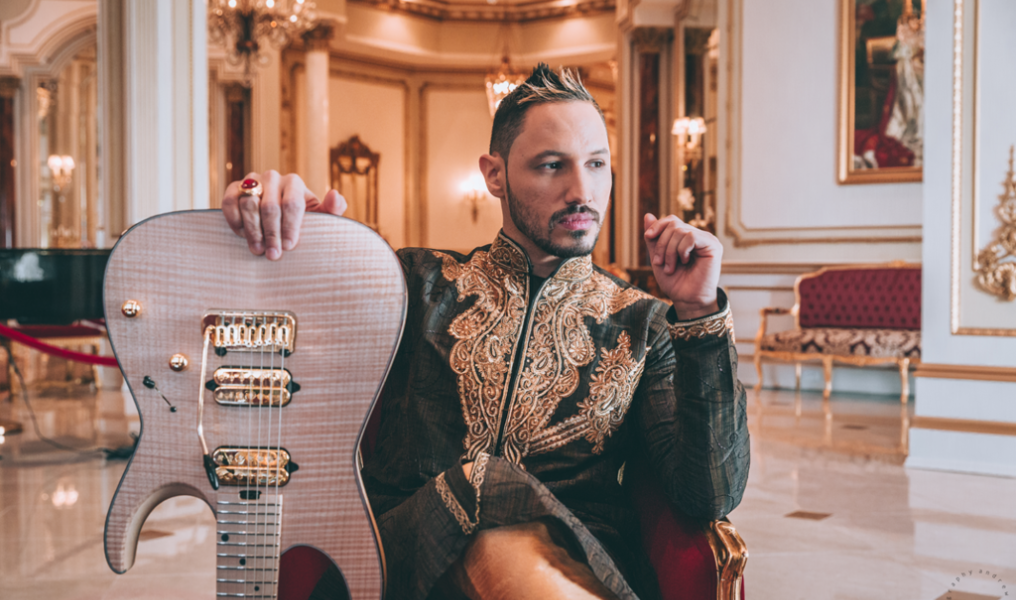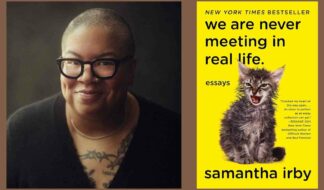Whether escorting fans on a seasonal tour of the universe, providing a musical accompaniment to some of the brain's most key neurotransmitters or removing song titles from an EP altogether, Angel Vivaldi's artistic vision has consistently set his projects apart from other heavy hitters in instrumental guitar music. However, his latest project is a means to bring both fans and musicians closer together. It's called The Guitar Collective 2018 tour.
Now in its second year, it showcases the talents of not only Vivaldi but other musicians who are paving the way in the genre with their own unique styles. Touring with Vivaldi will be guitarist Nita Strauss, of Alice Cooper fame, and Jacky Vincent, formerly in Falling In Reverse. The tour will head to Ferndale's own Loving Touch on Sunday, Nov. 25.
In advance of his Michigan appearance, BTL spoke with Vivaldi about being a trailblazer in instrumental guitar, his sources of inspiration and what it's like being openly gay in the world of heavy music.
You've said the Guitar Collective tour is a way for people to see stand-out acts in the heavy instrumental guitar world. What pulled you to start this project?
There's a big wave of more modern-day guitar players that I really wanted to give an opportunity and I wanted to give their audience an opportunity to see them live — as opposed to them just sticking to watching them at home on their phones and YouTube. It's a different dynamic, a different energy. This is technically the second year. There were three events. The first event was a NAMM (National Association of Music Merchants) in 2017. It was just the NAMM Convention in Anaheim and it was a showcase there, and then the second year it became a tour.
For people who might not be familiar with your music, how do you go about introducing people to heavy instrumental music and its different types?
[I tell people to] think about it as just replacing the voice, not necessarily the genre. There's still melody there. I think that's the beauty with instrumental: whether to say a little bit or to say a lot. The melody is there but there's no lyrics telling someone how to feel about a song. My song "Serotonin" could be about, God forbid, your dog dying or you losing someone despite it being very uplifting. There's no lyric dictating how someone should feel about a song, which I think is a very beautiful thing.
Speaking of "Serotonin," that was a track off of your latest album "Synapse." You perform that song with Nita Strauss. Was that the first time the two of you had collaborated creatively?
Yeah. We've been friends for a number of years, however, it was the first time I felt it was a really good platform for her to showcase what she does best. And with "Synapse" being a big concept record and obviously, we wrote the song title, "Serotonin," the whole premise behind it is a very uplifting, positive kind of playful dynamic. That's what serotonin is about; it's the confidence molecule. So, her having played with Alice Cooper for so long and having that very over-the-top performance and very playful energy, there's no doubt she was the perfect person to be a guest on one of the songs. That's how it came about.
Although you've worked with bands and other musicians before, much of your work is solo projects. Now that you're touring together along with Jacky Vincent, have you learned new approaches to solo guitar or found yourself reevaluating your own style?
I have been doing this for 15 years, so having been doing it for so long, you definitely learn from people you get close to in the arts and in the industry. But it feels that the most I've learned about it is how to relate to people. The way I look at it is my yellow and someone's blue can make a beautiful green. But, then there're other people and their blue is a little bit off and we make a really crap green, you know? You have to really be honest and aware enough to know how to shift your color a little bit to complement theirs to get the big picture done. I think that's the biggest thing people have taught me in this industry.
You once said that to keep your music fresh you wrote songs to play slightly outside of your ability. Do you still do that?
Oh yeah. I still do that. A big portion of what I write actually happens in the car. If I have the song written and I'm looking to write over it, I'll listen to the song while I'm driving and I'll write it in my head and then, from there, I'll kind of translate the idea to guitar. For some songs like "Adrenaline" for instance, it has very high energy, it's fast, it's very melodic and there's a little bit of a push to push my abilities. That album was a little bit out of my ability to get better. But if I didn't write out of my ability a little then I'd be very complacent, I'd be very bored doing the same thing over and over again.
How do you go about writing songs? Much of your work revolves around a single topic it seems.
I'm a very conceptual writer. So, depending on the theme that I'm writing, it's going to greatly influence the dynamics. So, for instance, "Synapse" is about brain chemicals and neurotransmitters. So, writing a song about serotonin, you have to be very conscious, you have to do your research, you have to know what serotonin is about to translate it to a song. I'm very moved by interior design and if I wasn't a musician I would have been an interior designer, but what I did was I took my studio, painted it red and wrote adrenaline. Then I painted it blue, painted it black and so on for each song. I did that and that really influenced how I wrote it.
Being an openly gay musician who performs heavy music runs against many stereotypes both within the LGBTQ community and in music. Have you faced any challenges since coming out?
I would say that you're always going to have issues to some degree, but for the most part, it's been incredibly supportive and positive. Starting in 2003, I didn't really come out publicly until maybe 2013. The thing is, I wanted to earn my career by merit, I didn't want to earn it by gimmick. I didn't want to be some gay guitarist. Eventually, when I did come out the way I did, a lot of people found it incredibly inspirational. I had fans messaging me up to a week after telling me that they actually came out to their families because of that.
Because it is atypical for someone who listens to heavy music to be gay or be comfortable with being gay. The thing with rap, too, is that there's this sense of machismo and hypermasculinity that captivates that whole world. There's definitely a stigma there, but we're all out there. So, it just matters who is going to go out there and relate to people in that respect.
Since you came out five years ago, has it influenced your music or your performances at all?
It really did, honestly. For instance, on this coming out on tour, I'm coming out to "Work B**tch" by Britney Spears. I probably wouldn't have thought to do that if I wasn't an openly gay man. There's a certain tongue-in-cheek playfulness in establishing who I am. I spread myself very thin in my career, and I do everything myself. I'm not on a label, I don't have a manager or anything like that, so taking that into consideration it's too much work to not be myself. It's incredibly healthy for artists to do that for their own wellbeing and I think it's healthy for people to see that because it exists.










